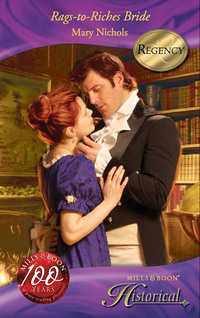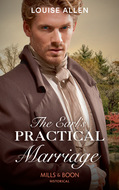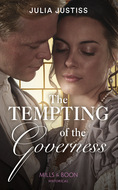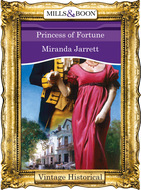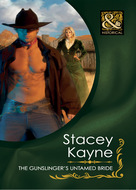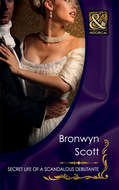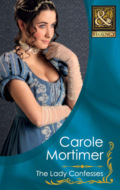Kitap dosya olarak indirilemez ancak uygulamamız üzerinden veya online olarak web sitemizden okunabilir.
Kitabı oku: «Rags-to-Riches Bride»
The feel of his mouth on hers sent shock waves right through her.
Her knees began to tremble, and would have buckled if he had not been supporting her, holding her so close against him she could feel his warmth, turning her insides to liquid fire. She seemed to have left the ground, flying from all earthly things, all sensible thoughts. She wanted this man. She wanted the kiss to go on, to lead to other transports of delight she could only imagine. She clung to him, returning his kiss in full measure.
It was only then he realised what he was doing and released her. They stood facing each other, breathing heavily. Neither spoke. She did not condemn him; any sign of anger would be a pretence, and he must know it. Nor did he regret what he had done—though he did not know why he had done it, nor why a simple stolen kiss should have such a devastating effect on him. It had unnerved him. He opened his mouth but no words came from his lips. ‘Sorry’ seemed inadequate. She was lovely, and the temptation had been great, but that did not excuse him. Besides, he wasn’t sorry.
Born in Singapore, Mary Nichols came to England when she was three, and has spent most of her life in different parts of East Anglia. She has been a radiographer, school secretary, information officer and industrial editor, as well as a writer. She has three grown-up children, and four grandchildren.
Recent novels by the same author:
THE HONOURABLE EARL THE INCOMPARABLE COUNTESS LADY LAVINIA’S MATCH A LADY OF CONSEQUENCE THE HEMINGFORD SCANDAL MARRYING MISS HEMINGFORD BACHELOR DUKE AN UNUSUAL BEQUEST TALK OF THE TON WORKING MAN, SOCIETY BRIDE A DESIRABLE HUSBAND RUNAWAY MISS
RAGS-TO-RICHES BRIDE
Mary Nichols
MILLS & BOON
Before you start reading, why not sign up?
Thank you for downloading this Mills & Boon book. If you want to hear about exclusive discounts, special offers and competitions, sign up to our email newsletter today!
Or simply visit
Mills & Boon emails are completely free to receive and you can unsubscribe at any time via the link in any email we send you.
Chapter One
1837
‘Papa, you will make yourself ill if you do not take some nourishment,’ Diana said, leaning forward to take the half-empty glass of cognac from her father’s hand and put a plate of food on the table in front of him.
‘Not hungry.’
‘No, I am told strong drink dulls the appetite.’ She put his glass down on the table and sat down opposite him. He had once been robust, weatherbeaten from years at sea, a loving husband and beloved father who made their lives carefree and interesting, until four years before when his left arm had been amputated after a skirmish in the Indian Ocean and he had given in to his wife’s pleading to leave the service before it killed him. The loss of his arm and what he termed a life of uselessness on shore had started the downward slide, but while her mother was alive he had still been the father she knew and loved. Since Mama’s death he was not the same man at all.
‘We cannot go on like this, Papa. Something must be done.’
‘What about?’
‘How we are to manage.’
‘I have a pension.’
She sighed. ‘I know, but it is not enough.’ She was tempted to add that he drank most of it, but that would have been cruel and she desisted. Together with the tiny pension, he had left the service with a small accumulation of prize money but that had disappeared very quickly trying to keep up their hitherto comfortable way of life. They had been forced to dismiss their servants, sell their furniture and move into smaller accommodation, and when even that proved too much to maintain, to these two rooms in a boarding house in Southwark. These were poorly furnished; though Diana did her best to keep them clean, the grime seemed ingrained in the fabric of the tall, narrow tenement. It was difficult to maintain standards, but she was determined not to let them slide even further into poverty.
Her mother had made ends meet by taking in fine embroidery from a dressmaker in Bond Street, but now Mama was gone, worn out with the stress of it all, Diana knew she had to do something herself to keep the wolf from their door. She had no one to turn to, not a relative in the world that she knew of, and her father was becoming more and more hopeless.
If only he would rouse himself, he was not beyond a little light work, but he did not seem able to drag himself out of the pit he had dug for himself. In the two months since Mama’s death, he had spoken only briefly and then only when necessary, and he had hardly eaten at all. His diet consisted almost exclusively of strong liquor with which he hoped to achieve oblivion.
‘I must find work,’ she told him. ‘The rent is due and there is very little food in the larder.’
‘Do what your mama did.’
‘I tried that yesterday. Madame Francoise told me I was not skilled enough.’ That had rankled, considering she had been doing most of the work since her mother became too ill to do it herself, though they had never told Madame that. ‘Plain sewing, perhaps, but they had nothing to offer me; in any case, the wages for that make it no more than slave labour.’
‘We will manage.’ He reached for his glass and she gave up. It was up to her to do something. If she did not find work soon, she would have to sell her mother’s necklace. Mama had given it to her just before she died and Diana treasured it as a lasting memory. Its stones were a pale greenish colour, which she thought were opals, set in silver filigree. She doubted it was valuable—her father had never been wealthy enough to indulge in expensive trinkets—but it would be a dark day indeed when that had to go.
Swathed in mourning black in spite of the heat of a summer’s day, she left their lodgings and set out with a handful of advertisements culled from the newspaper, determined to find something, but everything she tried—lady’s companion, lady’s maid, governess to small children—all required her to live in and that she could not do. Who would look after her father if she did not come home to him every night? She thought of teaching, but her education had been so unconventional that she was not considered suitable, except at dame-school level and the pay for that was barely enough to feed her, let alone her father. Besides, she knew their landlady, Mrs Beales, would not allow her to use their lodgings for the purpose.
The man in the employment agency she tried was disparaging. ‘I could try for a position as a domestic servant,’ he said, ‘but I doubt you would suit. You need to be properly trained and experienced, and have excellent references…’ He paused to shrug his shoulders and look over his spectacles at her with a certain amount of compassion. This applicant had obviously been genteelly brought up, not in the highest echelons of society but high enough to exclude her from menial tasks. Beneath her large unbecoming bonnet, her complexion was unlined and unmarked, her hands were smooth and white; her clothes, though not the height of fashion, were well made in a good bombazine. ‘And in any case, you would need to live in.’
‘I cannot do that,’ Diana told him. ‘I have to look after my invalid father.’
‘Then I am afraid I cannot help you.’
She had known before she entered that it was hopeless. She thanked the man and set off she knew not where. Unwilling to go home with her mission unaccomplished, she walked down Regent Street and turned into Burlington Arcade. Perhaps she could obtain some plain sewing from one of the many fashion shops that traded on that busy thoroughfare—low pay was better than no pay at all. The shops were all high-class establishments, catering for the elite. Surely someone would employ her?
She stopped to look into the window of a shop displaying costly silks, ornaments and trinkets imported from India and the Orient. She had seen items like that on her travels being sold in noisy bazaars and market places, at a time when she had been happy and carefree. Better not dwell on that, she decided, turning away. And then her eye was drawn to a ticket in the window. ‘Clerk wanted,’ she read. ‘Conscientious and quick at figuring. A good hand essential. Apply within.’
Diana knew perfectly well they wanted a man; ladies simply did not do that kind of work, but she did not see why they could not if their skills were appropriate. She and her mother had often travelled abroad when her father had been posted to some far-off station and she had been taught by her parents, augmented by her own curiosity, about the sights and sounds of foreign places they visited, as well as through her reading, which was wide ranging. Surely that must count for something? She pushed open the door and her nostrils were immediately assailed by a mixture of spices and perfume, which had once been so familiar to her.
A tall gangly youth came towards her, a smile of welcome on his face, assuming she was a customer. It was no good stating her errand to him; she would be laughed off the premises. She drew herself up to her full five feet five inches and faced him squarely. ‘I would like to speak to the proprietor.’
‘Mr Harecroft?’
‘If that is his name, yes.’
‘Do you have an appointment?’
‘No, but he will see me. My name is Miss Diana Bywater.’
She made herself sound so confident that he did not doubt her. He asked her to wait and disappeared into the back of the premises, while she looked about her. The shop was spacious and well laid out. There were shelves full of bolts of silk, muslin, gingham and chintz in a rainbow of colours, and others displaying ivory ornaments, snuff boxes, fans and tea caddies. Towards the back were larger items, stools and intricately carved chests. These were the source of the exotic odours. She had not noted the name of the establishment and remedied the omission by going to the door and reading it from the facia. ‘Harecroft Emporium’ it said in gold lettering. She had barely returned inside when the young man came back.
‘Please follow me.’
She was conducted through a labyrinth of rooms, all packed with merchandise, and up a flight of stairs along a corridor lined with closed doors, then up a second flight and along another corridor to a door at the end, where the young man knocked and ushered Diana in. ‘Miss Bywater, sir.’
Diana walked into the room, trying not to let the man who rose to greet her see that she was shaking. He was in his middle years, his hair the colour of pepper sprinkled with salt and his eyes piercingly blue. He wore a dark grey frock coat and striped trousers. His collar was tall and stiffly white, his cravat slate grey. ‘Miss Bywater,’ he greeted her, holding out his hand. ‘How do you do.’
‘Very well, sir.’ She shook the hand and allowed herself a quick look about her. The room was large. The desk from which he had risen to greet her was in its centre, facing the door. One wall was covered in shelves containing ledgers and boxes, a large window occupied the middle of another wall and there were several upright chairs and two small tables. She was favourably impressed by its neatness and the fact that there was a square of good-quality carpet on the floor surrounded by highly polished boards. ‘You are the owner of this establishment?’
‘I am its proprietor. It is one of several under the Hare-croft banner. Please sit down.’ He resumed his own seat behind his desk and steepled his hands on it, waiting for her to state her business.
‘I see from the card in your window that you are seeking a clerk.’
‘We are indeed.’ Again he waited.
‘Then I am that clerk.’
‘You!’ He made no attempt to disguise his amusement. ‘You are a woman.’
‘So I am.’ She looked down at her skirt as if to confirm this, but really to renew her courage, before raising her eyes to meet his gaze. ‘Would you prefer a man? I could dress up in a man’s clothes and cut my hair. Would that make a difference?’
‘No, certainly not. Miss Bywater, you surely did not think I would entertain such a preposterous idea? My employees are all men, we have never employed women in the business—’
‘Now, that is not quite true.’ The voice came from behind Diana and she swivelled round to face a very old lady who had that moment entered the room. She was tiny, but very upright. Her snow-white hair was pulled up under a black bonnet with a purple feather curling round its brim. She wore an old-fashioned gown in purple taffeta and a short black cape. Her face was lined, but her eyes were the blue of a summer sky.
Diana realised almost at once that she must be related to Mr Harecroft and this was confirmed when he sprang to his feet and exclaimed, ‘Grandmother! What are you doing here?’
‘I have come to see you, since you have not been anywhere near Borstead Hall for months.’
‘We have been extremely busy, as you must know. Visitors to London are more numerous than usual what with all the goings on at court, foreign dignitaries arriving and everyone wanting black for the late King. Some are even buying material for their coronation clothes. They have money burning a hole in their purses, and who was it who taught me that the business must come first?’
The old lady laughed. ‘I did and I am a woman. So what is this young lady asking of you?’ She turned to Diana for the first time, a smile on her face. ‘Am I right in thinking you are here looking for work?’
‘Yes, ma’am.’
‘I am Lady Harecroft. The dowager, of course,’ she said, blue eyes twinkling. ‘But I once worked alongside my husband in this enterprise and helped build it up from nothing, which is why I said my grandson was not correct in saying the company has never employed women. One of its instigators was a woman.’
‘That’s different,’ Mr Harecroft said.
Her ladyship ignored him. ‘Tell me, child, why do you need to work and what can you do?’
‘My father is an invalid and my mother died two months ago,’ Diana answered her. ‘I need to earn a living that will allow me to live at home and look after my father. As for what I can do, I can write in a good hand, I am familiar with adding, subtracting, fractions, decimals and computing percentages. Items such as you have displayed downstairs I have seen and handled in India and the Far East.’
‘You are very young to be so well travelled.’
‘I am eighteen, my lady, and my father was a sea captain. Mama and I often travelled to distant parts to be with him.’
‘What will he do when you are at work?’
‘He is not so incapacitated that he cannot amuse himself, my lady. He has lost an arm and that has weakened him, but I am hopeful he will improve day by day. The demise of my mother affected him badly.’
‘Have you no relatives?’
‘None that I know of. Both my parents were without siblings and their parents long dead.’
‘Then you do indeed carry a heavy burden.’ She turned back to her silent grandson. ‘John, give Miss… Oh, dear, I do not know your name.’
‘Diana Bywater, my lady.’
‘Good Lord!’ The smile faded suddenly, her eyes opened wide and she put her gloved hand to her mouth with a little cry before sitting heavily in the nearest chair.
Diana started up in alarm. ‘Ma’am, are you not well?’
Whatever it was that had disturbed her, the old lady recovered quickly and the smile was back. ‘I am extremely old, my dear, you must forgive my little lapses.’ She opened her fan and waved it vigorously in front of her face. ‘It is so hot today, I am quite worn out with it.’
‘You should not have attempted the stairs,’ her grandson said. ‘If you had sent a message, I could have come down to you. I will send for Stephen to take you home.’
‘Very well. But give Miss Bywater a trial. If she is as good as she says she is, it will not matter a jot that she is a female.’
‘Grandmother,’ he protested, ‘women cannot be expected to do such meticulous work. They do not have the constitution for it, nor the mental ability…’
‘Nonsense! You forget the country is ruled by a woman now.’
‘The new Queen will no doubt be guided at every step by her ministers and advisers. There is no comparison. And how can I put Miss Bywater in a room full of men? I will never get any work out of them.’
‘Then find her a corner to herself. I am sure she can deal with any unwarranted attention.’ She turned to Diana and scrutinised her carefully, her gaze ranging from her sensible boots, her simple black dress and three-quarter-length coat to her wide-brimmed bonnet, which hid most of her face. ‘Take that bonnet off, girl.’
Diana did as she was told, to reveal lustrous red-gold hair which she had attempted, not very successfully, to drag into a knot at the back of her head. The old lady gave a secretive little smile, which puzzled Diana. ‘You will hide that under a suitable cap when you are at work, my dear, and you will wear a plain gown, long-sleeved and buttoned to the neck, otherwise you’ll do. John, you may send for Stephen now.’
Mr Harecroft picked up a bell from his desk and gave it a vigorous shake. Almost at once the young man who had conducted Diana upstairs entered the room and was told to find Mr Stephen Harecroft and ask him to come. He looked at Diana as he turned to obey and gave her a smirk, which told her he had been listening on the other side of the door. Lady Harecroft had said she could deal with unwarranted attention and she must demonstrate that she could. She gave him a haughty look and replaced her bonnet.
She was wondering if she ought to leave, but she had not yet been appraised of her duties or told her hours of work and remuneration. She was not even sure that Mr Harecroft would give her a job after Lady Harecroft had gone. He had certainly said nothing that indicated he would, had said very little at all, leaving the talking to his grandmother. She sat with her hands in her lap and waited.
Stephen Harecroft was a younger version of John, in his early twenties, Diana guessed. He had similar clear blue eyes and a shock of pale gold hair with just a hint of red. ‘You sent for me, sir? I was busy checking that last consignment of silk. It’s not up to the same standard as the last batch. We shall have to have words with our suppliers.’ He turned to the old lady, his face lighting up with pleasure. ‘Great-Grandmama, you here? How are you?’ He bent to kiss her cheek.
‘Perfectly well, boy. I want you to escort me back to Hare-croft House. I will stay with you tonight and go home tomorrow.’
‘A pleasure, but who brought you?’
‘Richard, but he’s gone to a meeting. He will join us for dinner.’
‘A meeting?’ Mr Harecroft queried. ‘With whom?’
The old lady shrugged. ‘I don’t know. He didn’t say.’
‘Something to do with his book, I dare say,’ Stephen said. Suddenly seeing Diana, he stopped. ‘I beg your pardon, ma’am.’ This with a bow. ‘I did not see you there.’
‘Miss Bywater is coming to work here,’ Lady Harecroft said.
‘In what capacity?’
‘Clerk,’ his father said.
The young man did not trouble to hide his astonishment. ‘But—’
‘No buts, Stephen,’ her ladyship said. ‘Miss Bywater is in every way suitable and she needs to work, so you will do all you can to help her.’
He looked from his great-grandmother to his father, one eyebrow raised in a query. His father shrugged. It seemed to Diana that the old lady’s word was law and, however much they might disapprove, they dare not go against her. She watched as the young man escorted his venerable relative from the room, then turned to face Mr Harecroft.
‘Ahem…’ he began, twiddling a pen between his fingers. ‘I assume it is no good asking you for references?’
‘No good at all, sir, but I am willing to demonstrate my ability.’
He reached into a drawer and drew out a ledger, opening it at random. ‘Add that column of figures, if you please.’ She did so. After he had checked her accuracy, he asked her to work out seven and a half per cent of the total. This done, she was required to copy a column of figures. If he had hoped to catch her out, he was disappointed. The speed with which she came back with the correct answers startled him. ‘My father set me practising on the bills of lading on the ships he commanded,’ she told him. ‘I also worked out the percentages of the prize money for each member of the crew. It was Papa’s way of teaching me mathematics.’
‘It seems to have worked,’ he murmured. ‘What else did he teach you?’
She was relaxed enough to laugh. ‘Oh, so many things. How to steer by the stars, the tides and ocean currents, the geography of the ports where we called, what they imported and exported, what it cost and what it fetched when it arrived in England, some of the culture. He is a very knowledgeable man.’
‘But now unable to work himself?’
‘That is correct.’ She shut her mouth firmly on expanding on that. She did not want him to know about her father’s drinking. It was something of which she was ashamed, ashamed most particularly because she could not coax him away from it. And bullying him only made him angry. He was her father, he would tell her, she had no right to question what he did.
‘I will give you a month’s trial. Your pay will be thirty-five pounds per annum and you will work from eight in the morning to seven at night from Monday to Friday and from eight until two on Saturdays. The men are given an allowance for a suit of clothes, so you shall have enough for two gowns. Grey, I think. Is that agreeable?’
‘Yes, thank you, but I would like to be paid at the end of each week, considering I am to live at home.’
‘Very well.’ He smiled suddenly. ‘You can no doubt compute how much that will be yourself.’
‘When shall I start?’
‘Tomorrow.’ He opened a cash box and extracted three guineas which he offered to her. ‘For your dresses. They will remain the property of the company.’
She rose to take the coins and put them in her purse, then thanked him again and left. He did not ask anyone to escort her off the premises, assuming she would find her own way down to the shop floor. Only when she was safely out into the arcade did she let out a huge breath of relief and allow herself to smile. She had done it! Sheer effrontery had paid off. At least for a month. She had no doubt Mr Harecroft expected to be able to say at the end of that time that the experiment had not worked and he must part with her. She had to disappoint those expectations, which meant not only being as good as the men he employed, but better. At the end of the month she must have made herself almost indispensable.
And she did. At the end of the trial, he was obliged to admit she had earned her pay and told her she could stay. She was still there a year later.
So that she would not distract the men she worked in solitary splendour in a little cubby hole on the second floor. Luckily it had a window which looked out onto the street at the back the shop, which she could open to let in a little air. She was doing that one hot day in June 1838, when she spotted the Harecroft carriage drawing up outside. She leaned out to see who had arrived and saw Lady Harecroft being escorted into the building.
Diana had not seen her ladyship since she joined the company the year before, and assumed her great age had precluded any more uncomfortable coach journeys from her home in Berkshire. But here she was. What had prompted her make the trip, especially in the heat of summer? There was no need for her to come shopping; anything she needed could be sent to her.
In the time she had been working at Harecroft’s she had discovered a great deal about the business and the hierarchy of the family who ran it. At its apex was the redoubtable dowager Lady Harecroft. Her husband, plain George Hare-croft then, had made his fortune in India where he worked for the British East India Company. Returning with his pockets jingling, he had not only married Lady Caroline Carson, the seventeen-year-old daughter of the Earl of St Albans, but, when Britain’s textile manufacturers forced the end of the East India Company’s monopoly of trade with the subcontinent, had set up Harecroft Importing and Warehousing from premises on the docks, which still belonged to the company and still figured largely in its affairs. Two years later his uncle died without issue and he became the second Baron Harecroft and inherited Borstead Hall near Ascot in Berkshire.
‘Everyone expected him to give up the business and live the life of an aristocrat, but he chose to continue building it up,’ Stephen had told her soon after her arrival. He had overcome his initial shock at her being employed and had assiduously obeyed his great-grandmother’s injunction to help her all he could. ‘I am told it caused no end of gossip, but he was never one to listen to tattle and he was encouraged by my great-grandmother who was, and is, a very unusual woman. Now we have a thriving import-and-export business and several shops besides this one. Great-Grandfather died some years ago and my grandfather took the title. He left the business then to concentrate on the estate where he breeds and trains race horses. My father took over here. One day, the warehouse and shops will be in my hands. Richard, of course, will eventually inherit the title and the estate in Berkshire.’
‘Richard is your brother?’
‘Yes. He is older than me by three years, but he disdains working in the business. He and Papa fell out over it years ago. He was in the army for a time, but now he says he is writing a book, though what it is about I do not know.’
‘Is he married?’
‘No. I do not think he is the marrying kind.’ And then he had abruptly changed the subject, talking about the estate and his grandfather’s love of horses and his great-grandmother, who would be ninety the following month.
That same almost ninety-year-old was even now being helped into the building by a young man Diana supposed was Mr Richard Harecroft. She hurried along the corridor and knocked on her employer’s door. ‘Mr Harecroft,’ she said, when he bade her enter. ‘The Dowager Lady Harecroft has just entered the building. I saw her from my window.’
‘Good Lord!’ he exclaimed, looking up from the paperwork on his desk. ‘How did she get here?’
‘By carriage, sir. There is a young man with her.’
‘Richard, I’ll be bound. Go down and make sure she is comfortable in the staff dining room. We cannot have her wandering all over the shop. Do not let her attempt to climb the stairs; the last time she did that, it nearly finished her. I will be down directly.’
Diana turned to go downstairs. At the bottom of the stairs was a full-length mirror and she paused long enough to check her appearance. Her grey dress was plain except for a few tucks down the bodice. It had tight sleeves and a high neck as her ladyship had dictated. Her hair had been drawn back under a white cap. She smiled at herself; she had obeyed Lady Harecroft’s instruction to cover her head, but it made her look almost matronly. What she did not realise was that her flawless complexion and neat figure gave the lie to that and her wide intelligent grey eyes made everyone, young and old, want to smile at her in a kind of conspiratorial way as if they knew she was playing a part.
‘Peaches and cream,’ her father had said, when he was in one of his more affable moods. ‘Just like your mother.’ Her mother had been slightly taller and her hair had been dark, but Diana was like her in other ways, intelligent, doggedly determined not to be beaten and sympathetic to other people’s problems without being soft. She had fitted into Harecroft’s well and though her male colleagues had been wary at first, most had come to accept her and sometimes brought their troubles to her sympathetic ear. Even Mr Stephen Harecroft.
She could not make up her mind about him. It had not taken her long to realise that Stephen idolised his father and would do anything to please him. At first he had talked to her about her work, but then they had gone on to speak of other things: what was happening in the world outside the business; the coming coronation of Queen Victoria, which had the whole country in a ferment of excitement; the recent publication of a People’s Charter, which had the nation split down the middle; the great technological advances being made; music, literature, the things they liked and disliked. Their little talks led to strolls in the park on a Saturday afternoon after work had finished for the day, and the occasional visit to a concert or a lecture. Only the day before he had asked her to accompany him to a Grand Ball to be held at Almack’s the evening following the coronation.
Was he just being kind or was he seriously courting her? Flattered as she was, she could not think of marriage while her father needed her. He had been much better of late and she was hopeful he was over the worst, but she was still careful not to give him any cause to relapse. One day she hoped they might move out of the shabby rooms they now occupied into something better; in the meantime, her address and her father’s affliction were secrets she guarded carefully. If Mr Harecroft were to learn about either, she was quite sure his attitude towards her would change; he might even find the excuse he needed to dismiss her. She must find a way to discourage young Mr Harecroft, meanwhile, there was his great-grandmother to deal with.
She found the old lady sitting in a gilded chair in the front of the shop, surrounded by fabrics, talking to Stephen. There was no sign of Richard. It appeared he had done as he had the year before: brought the old lady and left her.
Ücretsiz ön izlemeyi tamamladınız.

